

How Did Life Begin? Do You Want To Live Forever? BrainSex – Why We Fall in Love? BrainSex - Why We Fall In Love, is an interesting documentary about the science and natural findings as to why humans fall in love.
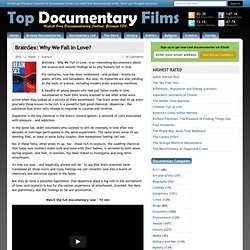
For centuries, love has been celebrated - and probed - mostly by poets, artists, and balladeers. But now, its mysteries are also yielding to the tools of science, including modern brain scanning machines. A handful of young people who had just fallen madly in love volunteered to have their brains scanned to see what areas were active when they looked at a picture of their sweetheart. The brain areas that lit up were precisely those known to be rich in a powerful feel good chemical, dopamine - the substance that brain cells release in response to cocaine and nicotine. Dopamine is the key chemical in the brain's reward system, a network of cells associated with pleasure - and addiction. Helen Fisher: The brain in love.
Videos - lectures, specials, television appearances - Helen Fisher. Are You Chemically Compatible? Why We Love by Helen Fisher. Neuroeconomics: In Oxytocin We Trust. The concept of trust is in many ways the connective tissue of society—governing everything from our personal relationships to our common use of currency.
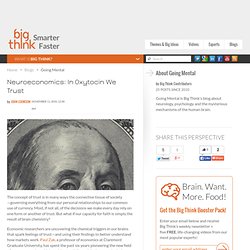
Most, if not all, of the decisions we make every day rely on one form or another of trust. But what if our capacity for faith is simply the result of brain chemistry? Economic researchers are uncovering the chemical triggers in our brains that spark feelings of trust—and using their findings to better understand how markets work. Paul Zak, a professor of economics at Claremont Graduate University, has spent the past six years pioneering the new field of neuroeconomics, which could potentially explain the neurological mechanisms that result in poverty and prosperity. Secrets of The Mind. In Secrets of the Mind we gain insights through various tragedies that have affected others, thanks to the logic and insights of Professor Ramachandran regarding what he calls the most complex organized matter in the universe.
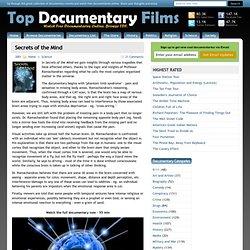
The documentary begins with "phantom limb syndrome" - pain and sensation in missing body areas. Ramachandran's reasoning, confirmed through a CAT-scan, is that the brain has a map of various body areas, and that eg. the right arm and right face areas of the brain are adjacent. Thus, missing body areas can lead to interference by those associated brain areas trying to cope with stimulus deprivation - eg. The Day We Learned To Think. Understanding of humans' earliest past often comes from studying fossils.

They tell us much of what we know about the people who lived before us. There is one thing fossils cannot tell us; at what point did we stop living day-to-day and start to think symbolically, to represent ideas about our environment and how we could change it? At a dig in South Africa the discovery of a small piece of ochre pigment, 70,000 years old, has raised some very interesting questions. Anatomically modern humans (Homo sapiens) emerged in Africa roughly 100,000 years ago. We know from fossil evidence that Homo sapiens replaced other hominids around them and moved out of Africa into Asia and the Middle East, reaching Europe 40,000 years ago.
Why Do We Talk? How Does Your Memory Work? Play - Den mänskliga gnistan : In i hjärnan. Why do women cry? Obviously, it's so they don't get laid. : Observations of a Nerd. I don’t think Brian Alexander is a bad guy or a misogynist.
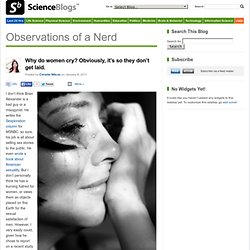
He writes the Sexploration column for MSNBC, so sure, his job is all about selling sex stories to the public. He even wrote a book about American sexuality. But I don’t personally think he has a burning hatred for women, or views them as objects placed on this Earth for the sexual satisfaction of men. However, I very easily could, given how he chose to report on a recent study published in Science about men’s physiological responses to the chemicals present in women’s tears. The headline alone was enough to make me gag — “Stop the waterworks, ladies. I didn’t even want to read the rest of the article.
He Said, She Said. Why don’t men like to stop and ask directions?

This question, which I first addressed in my 1990 book You Just Don’t Understand: Women and Men in Conversation, garnered perhaps the most attention of any issue or insight in that book. It appeared on cocktail napkins (“Real men don’t ask directions”) and became a staple of stand-up comics as well as jokes that made the rounds: “Why did Moses wander in the desert for 40 years?” And “Why does it take so many sperm to find just one egg?” The attention surprised me. Evolution: Having Some Fun With It : Observations of a Nerd. Ok, you caught me!
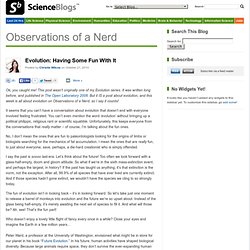
This post wasn’t originally one of my Evolution series. It was written long before, and published in The Open Laboratory 2008. But it IS a post about evolution, and this week is all about evolution on Observations of a Nerd, so I say it counts! Richard Dawkins – The Blind Watchmaker. The Greatest Show on Earth: chapter 1. Extracts from chapter 2. The Purpose of Purpose - Richard Dawkins. Ep 1: Waking Up in the Universe - Growing Up in the Universe - R. The Blind Watchmaker. Apple Computer, Inc. makes no warranties, either express or implied, regarding the enclosed software package, its merchantability, or its fitness for any particular purpose.

The exclusion of implied warranties is not permitted by some states. The above exclusion may not apply to you. This warranty provides you with specific legal rights. There may be other rights that you may have which vary from state to state. Macintosh System Tools are copyrighted programs of Apple Computer, Inc. licensed to W. Richard Dawkins: Growing up in the universe. Why Are We Here? The Four Horsemen: Dawkins, Dennett, Harris, Hitchens (1/12) Sam Harris: Science can answer moral questions.